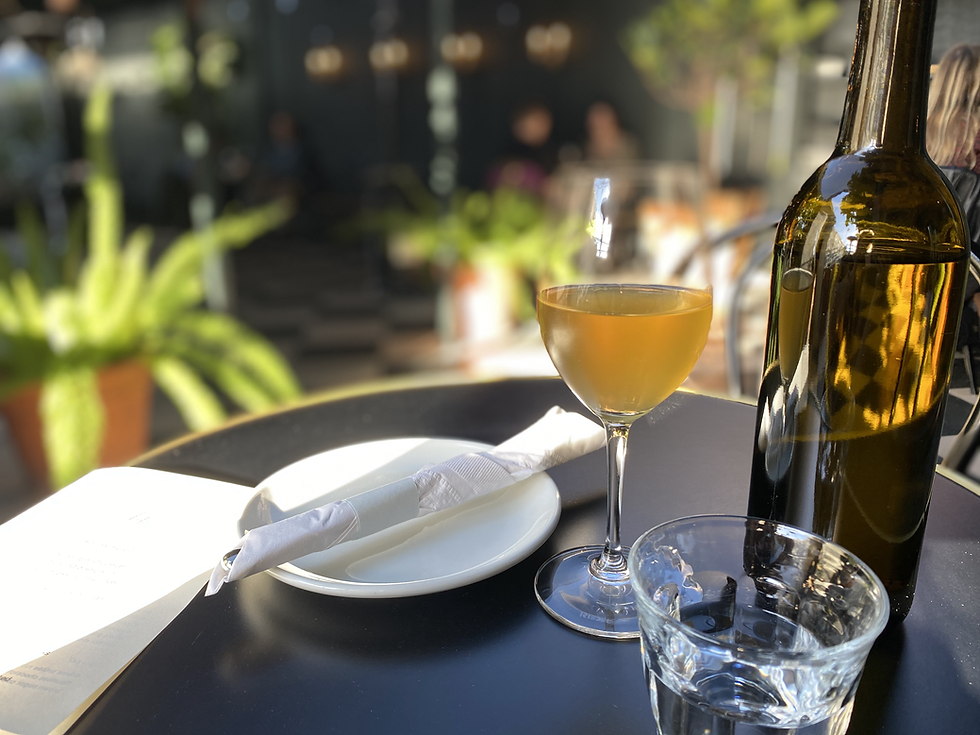Natural Wine? Orange? Pét-Nat? Exploring New Wine Trends
- Sarah Mathias
- Apr 4, 2021
- 3 min read
As a Wine Sales Representative in Hollywood, I often get asked these questions...
"We only sell natural wines, what do you have in your portfolio?" or
"Do you have any orange wine?"
This traditional thousand year old process of making "natural" wine is now a trend sweeping the nation and everybody wants in!

( Lolo Wine Bar. Hollywood, CA)
What is natural wine?
There is no official designation of what a natural wine is but it usually means:
the wine is hand harvested from from organic or biodynamic vineyards
No pesticides, herbicides, or chemicals
uses native yeast for fermentation,
un-fined and unfiltered
no additives
Little to no sulfites
Comes from small, independent producers
Basically natural wine is simply fermented grape juice and nothing else! It allows the grape to show it's true expression from the earth, with little to no winemaker intervention.

Pros and Cons

Natural wine is so much fun to experiment with and try, however I don't want anyone coming away thinking, "so is normal wine...unnatural...?"
(Tablas Creek Vineyards, Paso Robles)
Wine that is not considered natural can still be from small production organic vineyards that don't use pesticides or a lot of additives, but they simply want more control and consistency over the final product and can achieve that through methods like cultured yeast, filtering, fining, adding sulfites etc. so please don't write off your "non-natural" wine buddies!
Some pros and cons of natural wines to be aware of:
Pros:
Tasting the wine grape it's truest, most un-altered form!
Feels good that the vineyard is not harmfully affecting the environment
Always Vegan, due to no fining! (Fining often uses egg whites which in turn makes the wine not Vegan)
Often tastes very unique and distinctive, not like your everyday Cab Sauv
Cons:
Wine can tend to go bad much quicker due to minimal or no added sulfites which help to preserve wine - they aren't meant to be aged
Off characteristics or differences from bottle to bottle are more common due to the wine being a bit more "alive" in the bottle, and therefore more susceptible to change
Can often have a lot of sediment and sometimes the funky flavors are a bit...too funky
Cannot be mass-produced... so may be hard to serve at your 300 person wedding!

(Giant qvevri clay pot in Georgia - one of the early wine-making vessels)
What is Orange Wine?
Orange wine is another huge growing trend in the U.S. right now. It is white wine that is made like a red wine - meaning the grapes are fermented with their skins, giving the wine an orange hue.
The skin-contact gives the wine tannin and structure not often found in white wines. They tend to have some fun oxidative flavors like bruised apple or tangerine, some say it reminds them of a refreshing Cider.

(Mignon - Downtown LA)
I have to say, the few orange wines I have tried I have loved, so definitely look around for one at your local natural wine store!
What is Pét-Nat?
Pét-Nat is short for pétillant naturel, which means "naturally sparkling" wine. It's made by taking wine that is still fermenting, and capping it, allowing it to finish fermenting in the bottle.

It actually stems from "Methode Ancestral", which is the first way sparkling wine was ever discovered. Way back when, wine that was believed to be done fermenting was put in a bottle, only to be opened later and found with bubbles! The wine's fermentation had stopped due to the cold temperature and once it warmed up, it started fermenting again, releasing carbon dioxide and making bubbles in the wine!
At first winemakers believed it as a fault, but gave it a try and it started a revolution! Pét-Nat is a great nod to this traditional style of sparkling wine-making, just be prepared for some leftover yeast in your glass!
Hope you enjoyed learning about Natural wines, let me know some of your favorite producers in the comments!




Comments